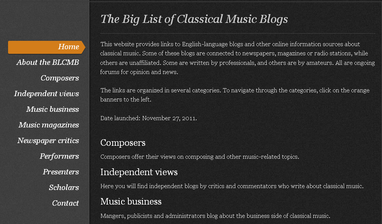
It’s a project that I’ve been working on for a little while – ever since I went searching for some kind of comprehensive online index or directory of blogs about classical music, and couldn’t find one.
| Dr. Colin Eatock, composer |
|
 The BLCMB: http://classical-music-blogs.weebly.com Yesterday I launched a new website, called The Big List of Classical Music Blogs. It’s a project that I’ve been working on for a little while – ever since I went searching for some kind of comprehensive online index or directory of blogs about classical music, and couldn’t find one.
6 Comments
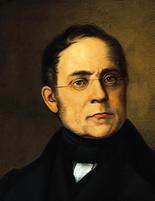 Has his time come? Will it ever? A couple of weeks ago I was talking with Toronto pianist Anton Kuerti. And in the course of our conversation, he told me about a new set of three compact discs soon to be released on the Doremi Legendary Treasures label. Kuerti has made available to the Doremi people a collection of recordings by a composer the musical world loves to hate. Back in 2002 Kuerti presented a Carl Czerny Festival, in Edmonton, Canada. It was billed as the world’s first festival devoted to this composer – a claim that certainly rings true. 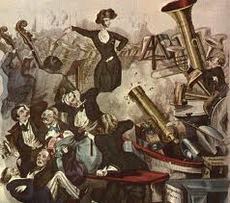 Berlioz knew how to do it. If you’re a composer, you will probably already know quite a lot about this subject. But if you’re not a composer, you may not have thought much about how, in this day and age, composers of “classical” music get their music performed. There are in fact many methods that composers employ to bring their music before the public. And I’ve come up with what I believe is a useful and revealing way to organize these methods, which I call the “Contrived-Real Continuum.”  LIke all good revolutions, it's not televised. Here’s something I contributed to today’s Globe and Mail newspaper, about Classical Revolution chapters in Canada. It’s late on a chilly Tuesday night in October, and Toronto’s St. Clair Avenue looks dark and deserted. But there’s live music at Dave’s, a local bar, and the place is packed. 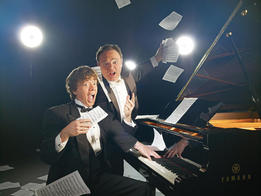 Dykstra and Greenblatt share a moment of angst. Earlier this week, I took in Two Pianos Four Hands at Toronto’s Panasonic Theatre. For any who may not know it (and if you don’t, I must wonder where you’ve been), this is a play about studying the piano. It’s the creation of the Canadian actor-pianists Ted Dykstra and Richard Greenblatt – a kind of quasi-autobiography of their childhood and teen years as they pursued the dream of becoming concert pianists. 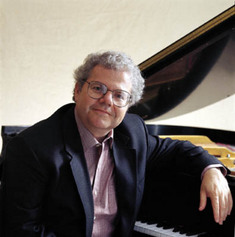 Emanuel Ax. Here’s my interview with Emanuel Ax, from today’s Houston Chronicle. (When I last heard him, in October, he gave a performance of Brahms’ First Piano Concerto with the Toronto Symphony Orchestra that was absolutely amazing. You can read my review of that concert here.) This is a milestone year for the concert pianist Emanuel Ax: It’s been 50 years since he arrived in the U.S. Born in Ukraine in 1949, Ax came to North America as a boy with his family. After a year and a half in Winnipeg, Canada, the Axes moved to New York in 1961. Emanuel was 12 at the time, and he enrolled at the Juilliard School. 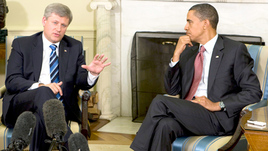 Can Obama and Harper work it out? In the last few weeks, I’ve heard Ann Summers, a Toronto-based manager of classical musicians, speak on two occasions about the North American Free Trade Agreement. It seems that the treaty’s impact on Canadian musicians trying to work in the USA has been pretty much a disaster, and she’s trying to do something about it. 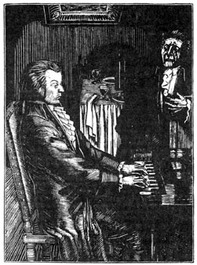 Mozart and Salieri: it was complicated. Here’s my review of Toronto’s Tafelmusik Baroque Orchestra, from the weekend’s Globe and Mail. Was there an intended irony in the title of Tafelmusik’s concert “Mozart and Friends”? Mozart and Haydn had deep respect for one another, and Ditters von Dittersdorf was a friend, too. But to add Antonio Salieri to the list of Mozart’s “friends” is questionable. No, Salieri didn’t murder Mozart – but the two composers were rivals, and their relationship was rather complicated. 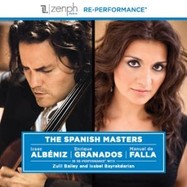 Bailey and Bayrakdarian, with De Falla. It seems that the imaginations of John Q. Walker and his associates at Zenph Sound Innovations know no bounds. He’s the technological wizard who invented the piano “re-performance.” A re-performance involves using computers to extract complex performance data from an old piano recording, and then programming a Yamaha Disklavier Pro piano (essentially a high-tech player piano) to play it back. 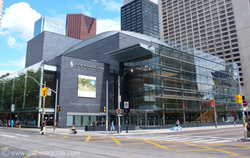 From Toronto to the world? Yesterday evening I was one of about 100 people who attended the annual general meeting of the Canadian Opera Company. I’ve been to these things before: they’re usually staid, low-key events, and this was no exception. The main item in the company’s financial statement was that the COC earned a modest surplus of about $10,000 last year, on a budget of $36.7 million. That’s good news, in a year when the company spent about $1 million to tour The Nightingale and Other Short Fables to the Brooklyn Academy of Music, in New York. |
Eatock Daily
I'm a composer based in Toronto – and this is my classical music blog, Eatock Daily. Archives
May 2024
Index
Click here for an alphabetical list of blog entries.
|